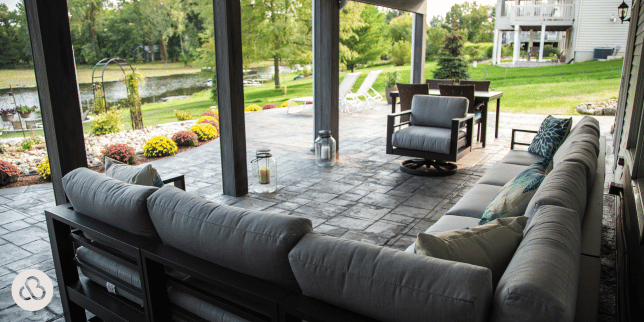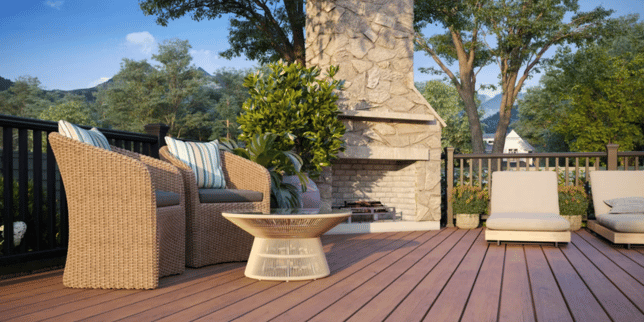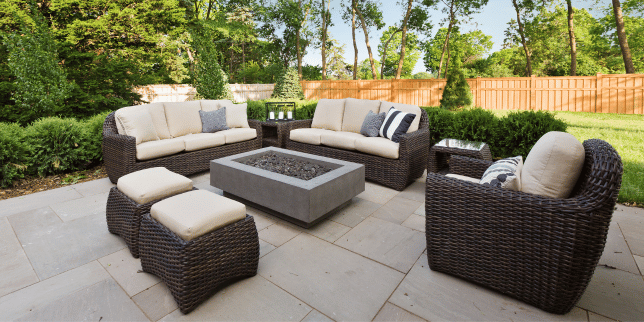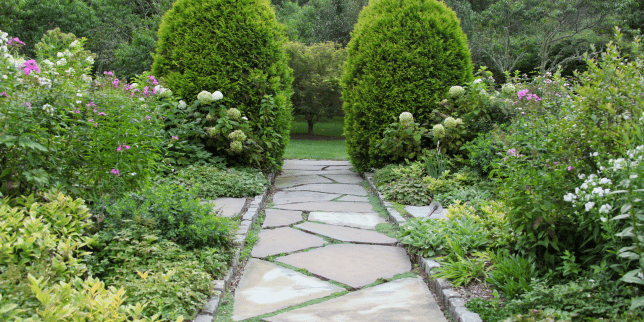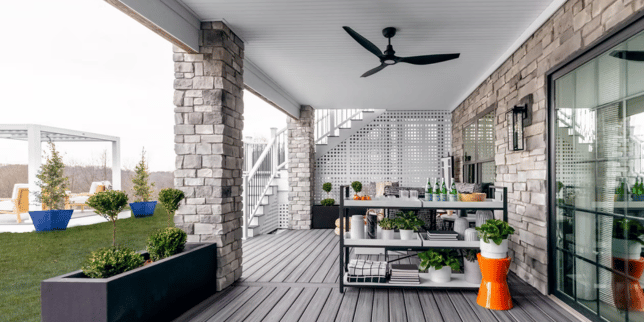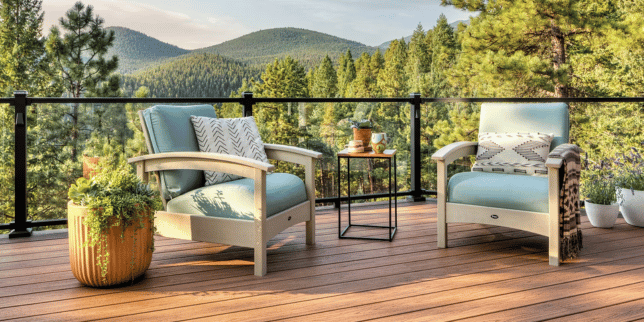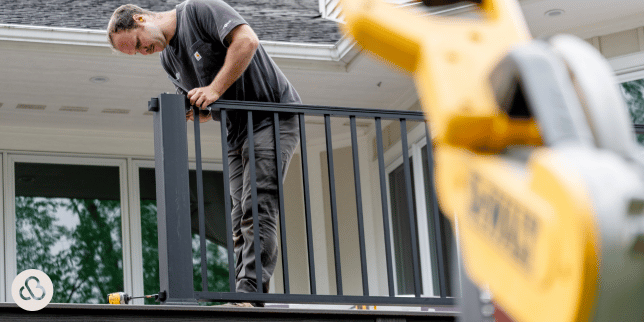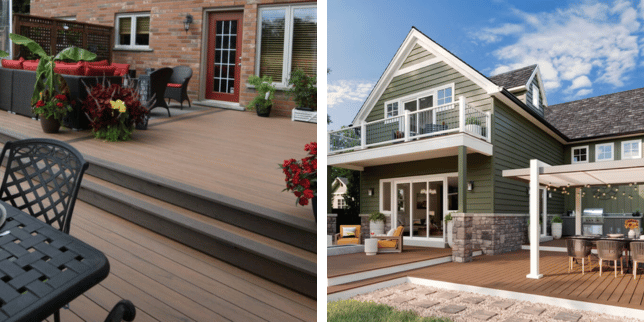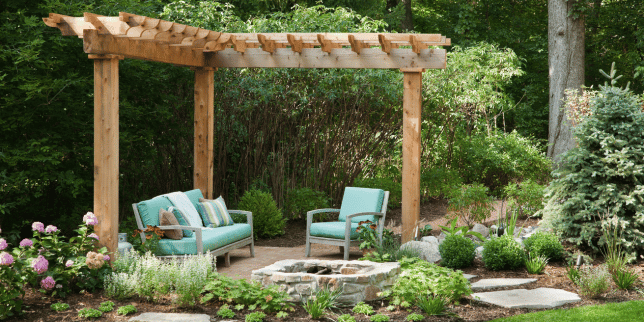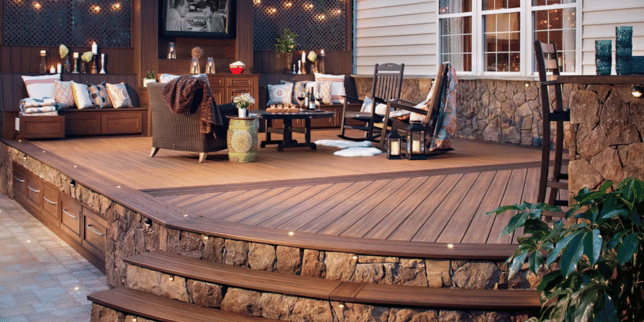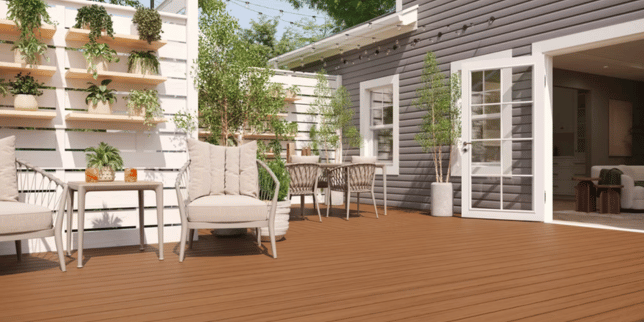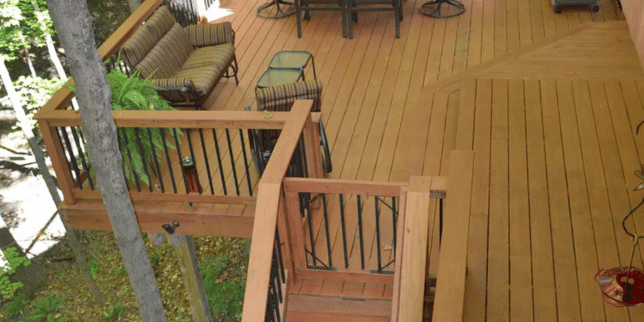What is Composite Decking?: Frequently Asked Questions
March 19th, 2024
5 min read

Are you thinking about building a new deck or improving your outdoor area but feeling unsure about which decking material to pick? With so many options available, deciding which is the best fit for you can be hard.
Not knowing the advantages of each decking material could lead to selecting one that doesn't align with your preferences or lifestyle, potentially resulting in dissatisfaction and costly mistakes.
With over 15 years of deck-building experience, we’ve crafted thousands of beautiful composite decks. We understand the challenges and uncertainties of selecting the right decking material. We're here to share our expertise and guide you through the process.
In this article, you'll gain valuable insights into composite decking, one of the most popular decking options on the market today:
- What Is It Made Of?
- How Is Composite Decking Different From Traditional Wood Decking?
- What Are the Main Benefits?
- Is Composite Decking Environmentally Friendly?
- How Long Does It Last?
- Does Composite Decking Fade or Stain Over Time?
- Can It Be Painted or Stained?
- Is Composite Decking Slippery When Wet?
- How Does It Handle Extreme Temperatures?
- How Does Composite Decking Compare to PVC Decking?
- What Are the Main Disadvantages?
1. What Is It Made Of?
Composite decking is a type of decking material made from a blend of wood fibers, recycled plastic, and binding agents. This combination creates a durable, low-maintenance decking option that mimics the look of natural wood. It's engineered to withstand outdoor elements like sunlight, moisture, and temperature changes.
2. How Is Composite Decking Different From Traditional Wood Decking?
This decking option differs from traditional wood decking in five distinct ways:
- Durability and Maintenance: Composite decking is known for its durability and resistance to rot, decay, splintering, and insect damage, requiring only minimal maintenance, like occasional cleaning. Traditional wood decking, on the other hand, demands more upkeep, including regular sealing, staining, and cleaning to prevent issues like rot, decay, warping, and insect infestation.
- Appearance: Composite decking offers a wide range of colors and finishes, often mimicking the look of natural wood with options for both uniform appearance and realistic texture and grain. In contrast, traditional wood decking provides the authentic aesthetic of natural wood, showcasing variations in color, grain pattern, and texture depending on the wood species used.
- Environmental Impact: Composite decking may incorporate recycled materials, such as reclaimed wood fibers and plastic bags, making it potentially more eco-friendly. Conversely, traditional wood decking sourced from sustainably managed forests can also be environmentally responsible, though concerns about deforestation and habitat destruction may arise depending on the species and harvesting practices.
- Cost: While composite decking generally has a higher initial cost compared to traditional wood decking, its lower maintenance requirements and longer lifespan can lead to cost savings over time. Traditional wood decking may be initially more affordable, but ongoing maintenance expenses should be considered.
- Material Composition: Composite decking is typically composed of a blend of wood fibers or flour, plastic, and binding agents, resulting in a durable and low-maintenance material. Traditional wood decking, on the other hand, is made from natural wood, such as pressure-treated lumber, cedar, redwood, or tropical hardwoods like ipe.
3. What Are the Main Benefits?
This decking option is durable, needs less upkeep, resists rot and bugs, and lasts longer than regular wood decking. It also comes in various colors and styles to suit different preferences. You don't have to worry about splinters or annual staining and sealing.
Here are a few more benefits you can expect from composite decking:
- Safety: Composite decking is often designed to be slip-resistant, providing better traction and reducing the risk of slips and falls, especially when wet.
- Versatility: Composite decking comes in various colors, finishes, and styles, allowing for more design flexibility and customization options to suit different aesthetic preferences and architectural styles.
- Resistance to Fading: Many composite decking brands are engineered to resist fading from prolonged exposure to sunlight, maintaining their color and vibrancy for more extended periods compared to traditional wood decking.
- Long-Term Cost Benefits: While the upfront cost of composite decking may be higher than wood decking, composite materials often require less maintenance and have a longer lifespan, resulting in lower long-term maintenance and replacement costs. Some composite decking brands offer cost-saving features, such as hidden fastening systems that reduce installation time and labor expenses.
4. Is Composite Decking Environmentally Friendly?
Composites often use recycled materials, which is more eco-friendly than cutting down new trees for wood decking. This reduces its environmental impact. Choosing this decking option can help minimize your carbon footprint.
However, it’s important to note that each composite decking brand manufactures differently. Research on how the company manufactures its boards will give insights into how environmentally friendly they are.
5. How Long Does a Composite Deck Last?
This decking material can last 25-30 years or more depending on the brand with proper care and maintenance. This makes it a long-lasting investment for your outdoor space.
Regular cleaning and inspections can help prolong its lifespan. Additionally, it is designed to endure outdoor conditions, ensuring it lasts for years.
6. Does Composite Decking Fade or Stain Over Time?
Most brands resist fading, staining, and discoloration. But sunlight and harsh weather can cause some fading. Quality brands can minimize these effects for long-lasting appearance.
Quality brands also offer extended warranties that guarantee their product. For example, Trex offers a 25-year warranty on all products and a 50-year warranty for their Transcend line.
7. Can It Be Painted or Stained?
Composite decking cannot be painted or stained like wood decking, but many brands offer a variety of colors and finishes to choose from. Some products may even have a wood-like texture for a more natural look. You also can select the color and style that best matches your outdoor aesthetic.
8. Is Composite Decking Slippery When Wet?
Composite decking has a textured surface that provides better traction than traditional wood. This makes it less slippery when wet. Yet, it's still important to exercise caution, especially in areas prone to moisture buildup.
9. How Does It Handle Extreme Temperatures?
Composite decking is engineered to withstand extreme temperatures without warping, cracking, or splintering. This makes it suitable for use in hot and cold climates, providing year-round enjoyment.
It's worth noting, however, that composite decking retains more heat than other options. Because of this, your composite deck will be too hot to walk on after prolonged exposure to direct sunlight.
On the other hand, due to its material composition, composite decking will last through those long and cold Michigan winters, where temperatures can drop well below freezing.
10. How Does Composite Decking Compare to PVC Decking?
Composite decking and PVC decking are both synthetic decking materials, but they have some differences. Composite decking typically contains wood fibers and recycled plastic, while PVC decking is made entirely from PVC resin. PVC decking tends to be more lightweight and resistant to moisture, but composite decking offers a more natural appearance and may be more environmentally friendly.
11. What Are the Main Disadvantages?
Here are some cons of installing this decking option:
- Initial Cost: Often higher upfront cost than wood decking materials.
- Heat Retention: Retains more heat than wood, making it uncomfortable to walk on in hot weather (Disclaimer: This depends on the brand and board.)
- Limited Color Options: Some composite decking brands offer fewer color choices than wood decking.
- Susceptibility to Scratching: While durable, it can be prone to scratching, especially from furniture or pets.
- Potential for Mold and Mildew Growth: In damp or humid environments, composite decking may be susceptible to mold and mildew growth if not properly cleaned and maintained.
Next Steps to Building Your Composite Deck
If you've been considering a decking project for your outdoor space but are unsure which material to choose, understanding the benefits of composite decking can help you make an informed decision.
By learning about composite decking and its advantages, you now know how to select a durable, low-maintenance, and eco-friendly decking option that meets your needs and preferences. Whether you prioritize longevity, sustainability, or design versatility, composite decking offers a range of benefits to enhance your outdoor living experience.
At Custom Built, we specialize in creating customized outdoor spaces that reflect your style and lifestyle. With over 15 years of experience in the industry, we have the expertise and dedication to bring your decking vision to life.
Ready to explore composite decking options for your outdoor oasis? Contact our team today to schedule a consultation and take the first step towards transforming your outdoor living space. Let us help you create a beautiful and functional deck that enhances the beauty and value of your home.
Now that you know more about composite decking, let’s explore how Custom Built will approach your project, how much your new structure will cost, and how long it’ll take to build:
- Dream, Design, and Build: Our Remodeling Process - This guide details how we at Custom Built will approach your remodeling project.
- How Much Do Composite Decks Cost in Lansing, Michigan? - An overview of how much your Lansing composite deck will cost and the factors that will influence your price.
- How Long Does it Take to Build a Deck (Factors that Affect Timeline) - Explore details that affect how long it takes to build your composite deck with Custom Built’s Proven Process as the foundation.
Isabelle has worked at Custom Built for over 7 years, learning the systems from all sides. She has become an industry advisor in the customer relations software HubSpot, has a keen talent for elements of design, and currently leads the marketing team under the innovative Endless Customers system.















